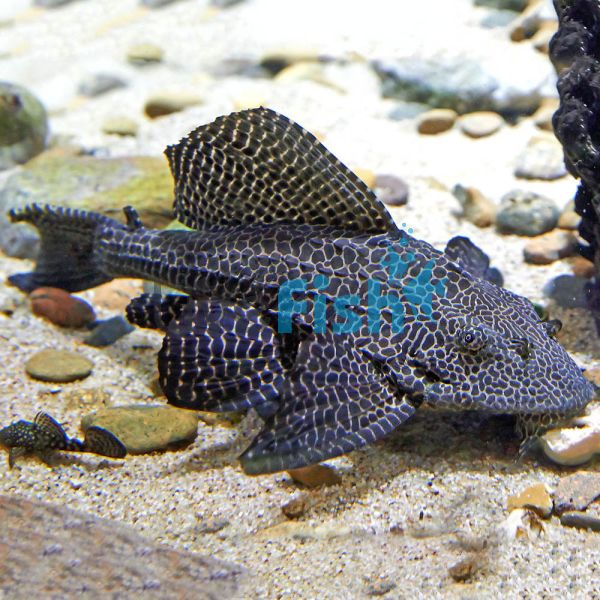Spotted Sailfin Plecostomus 8cm
The sailfish pleco also commonly known as the common pleco has unfortunately had a bad reputation over the recent years. Often sold at a small size as a ‘cleaner’ fish to beginners who are unaware of their maximum growing size and poor aquarium cleaning behavior these fish often do not reach their full potential or get released into the wild. Because of this, there are now thousands of sailfish pleco found in non-native waterways all around the world. This poor reputation is simply caused due to a lack of social awareness which causes a bad name for this otherwise eye-catching fish.
- Buy 5 for $80.92 each and save 10%
- Buy 10 for $71.93 each and save 20%
Spotted Sailfin Pleco
The sailfish pleco also commonly known as the common pleco has unfortunately had a bad reputation over the recent years. Often sold at a small size as a ‘cleaner’ fish to beginners who are unaware of their maximum growing size and poor aquarium cleaning behavior these fish often do not reach their full potential or get released into the wild. Because of this, there are now thousands of sailfish pleco found in non-native waterways all around the world. This poor reputation is simply caused due to a lack of social awareness which causes a bad name for this otherwise eye-catching fish.
For the aquarists who are looking to enter the ‘monster fish’ world the sailfin pleco would be a great starting species. They are a hardy, large growing, and eye-catching fish due to their colour patterning and armored tank-like appearance. The sailfin pleco will reach around 40 cm long however there are multiple reports of them reaching almost 60 cm which makes them a true monster amongst plecos and even commonly available cichlids. Sailfin plecos generally range from a dark brown to even black colour with an incredibly light brown ripple-like patterning all through the body. They have a flat underside with a large sucker-like mouth that they use to attach themselves to wood or even your aquarium glass. Sailfin plecos get their name from their characteristically large dorsal fin which looks amazing when they flare it out.
Like all plecos, these sailfish pleco species have a bony skeleton that acts like armor plating. This dense bone plating they have means even aggressive aquarium species would have a difficult time causing damage to the sailfin pleco. Plecos are often regarded as a cleaner fish and though species like the Bristle nose are great at eating algae the sailfin plecos tend to be more carnivorous and largely contribute to the bioload in an aquarium. Breeding the sailfin pleco in the home aquarium is a very difficult task because they are not sexually dimorphic and also have very specific breeding requirements which can often only be achieved in a pond-like environment. The wild habitat of the sailfin pleco is South America.
Tank Recommendations for your Sail Fin Pleco
Being a large growing pleco species the sailfin pleco does need a fairly large aquarium but is easy to care for species of fish. Because of their large size, it is best to keep them in a tank that is a minimum of around 380 liters. They also appreciate aquariums with lots of wood and cave-like structures as sailfin plecos tend to be more nocturnal. They also are not fussy about substrate types and can be kept in a sand or gravel substrate but also thrive in a bare bottom environment as well. being a South American fish, they do prefer softer water conditions ranging from the 6.0 - 7.0 ph mark.
Suitable Tank Buddies
The sailfin pleco is fairly peaceful and does not actively hunt fish however to stick to the safer side, nano aquarium fish should be avoided along with slow-moving or flat-bodied fish such as discus or stingrays. This is because there have been instances where sailfish plecos can rasp on the slime coat and skin of these fish causing extreme damage and even death. They are however suitable for a wide range of larger growing fish species.
Usually Compatible
Large growing South American fish such as Oscars, peacock bass, dovii, jaguar cichlids, and similar species
Sometimes Compatible
Medium growing and top dwelling community fish such as giant danios, silver dollars, keyhole cichlids, acaras, and kissing gouramis
Rarely Compatible
Small and slow swimming species such as neon tetras, discus, freshwater stingrays, lungfish, and freshwater sole
Feeding your Sail Fin Pleco
The sailfin pleco is very easy to feed and will accept a wide range of foods. due to their bottom-dwelling nature, they prefer to eat sinking foods and can be fed things like sinking pleco wafers. But they can also eat an all-around carnivore's cichlid pellet as well as fresh foods such as thawed fish pieces, prawns, and similar foods. Feeding should happen once during the day preferably when the lights are off.
| Scientific Name | Glyptoperichthys Gibbiceps |
|---|




